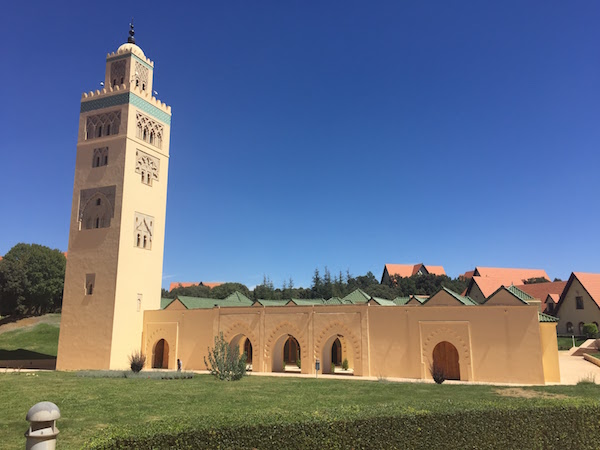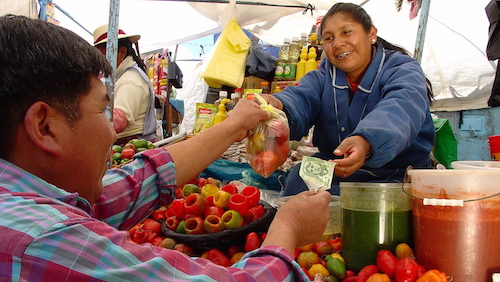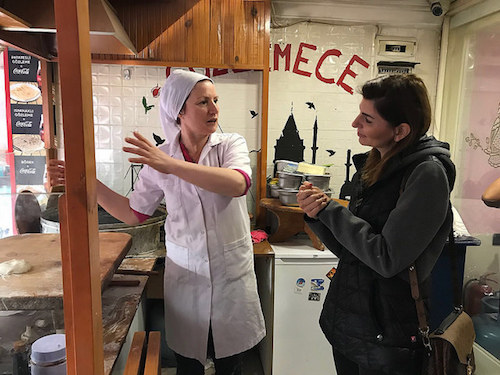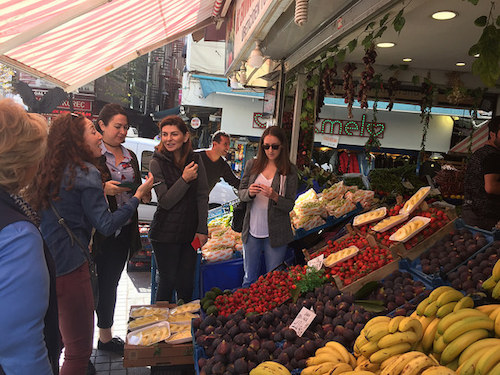
Al Akhawayn University in Morocco, one of the organizations participating in the M2GATE project. (Image by Meghan Neuhaus/WDI)
WDI has been selected by the Stevens Initiative to run an exciting program that uses online, collaborative learning to connect University of Michigan undergraduate students with their peers in four North African nations to find entrepreneurial solutions to social challenges in the region, while also increasing cross-cultural understanding and equipping young people with the skills needed to thrive in a 21st century economy.
Through a virtual exchange, U-M students at the Ann Arbor, Flint and Dearborn campuses will be teamed with fellow students in Egypt, Libya, Morocco, and Tunisia. Together, the teams will develop and launch social entrepreneurship projects with the help of instructors, mentors, and successful entrepreneurs from Michigan and the Middle East and North Africa (MENA) region.
WDI was one of 13 organizations chosen for the second cohort of the 18-month program, which is funded by the Stevens Initiative, an international effort to build career and global competence skills for young people in the U.S. and MENA region by growing and enhancing the field of virtual exchange. The Initiative honors the legacy of U.S. Ambassador Chris Stevens, who devoted his life to building bridges between people from different cultures.
The program, the MENA-Michigan Initiative for Global Action Through Entrepreneurship (M2GATE), will support three, eight-week cohorts, with the first beginning in January. Each cohort of 128 MENA students and 64 U-M students will culminate in a virtual competition. Judges will look for scalable solutions that feature science, technology, engineering, and math – or STEM-based – innovations. The MENA students from the winning teams will have the chance to travel to Michigan to interact with entrepreneurs in Ann Arbor and Detroit, and as a team pitch their projects to an expert panel for feedback and further development.
U-M students selected for the program will attend an orientation meeting as well as debrief and wrap-up sessions at the end of the eight weeks. They will be invited to watch lectures and interactive discussions on WDI’s ExtendEd learning portal on six topics: cross-cultural team building; communication skills; leadership development; introduction to entrepreneurship; design thinking and creative inquiry; and, creating a business model canvas.
The teams comprised of students from U-M and students from Egypt, Libya, Morocco, and Tunisia will coordinate times for virtual group work and produce a pitch video as a final assignment. In all, students will spend about 32 hours on the program over the eight-week time period.
The new programs at U-M and the other grantee organizations will expand the Initiative’s reach to 30,000 students in 18 countries in the Middle East and North Africa and 31 U.S. states. Examples of other programs in the second cohort include one that uses virtual exchange to improve global citizenship and problem-solving skills among hospitality students in the U.S. and Jordan, and an engineering program addressing common environmental and public policy challenges through collaboration between students in Arizona and the Palestinian Territories. The other Stevens Initiative grantees announced today are:
“With the support of the Stevens Initiative, young people from the United States, the Middle East, and North Africa are connecting and learning together – gaining important skills while learning about global cultures,” said Elliot Gerson, executive vice president of Policy and Public Programs of the Aspen Institute. “We look forward to working with the William Davidson Institute at the University of Michigan to scale the Initiative to Ann Arbor and Dearborn.”
“After the Arab Spring in 2010, young people in this region increasingly turned to social entrepreneurship to address the challenges in their societies,” said Amy Gillett, vice president of WDI’s Education Initiative. “Given the state of these economies and the upsurge of entrepreneurial interest, this program comes at an ideal time.”
The unique co-curricular program will equip students with skills in entrepreneurship, team building, innovation and design thinking, cross-cultural communication, international business, problem solving, and critical thinking.
“This is a wonderful opportunity for students to work cross-culturally, forge new international connections, and gain exactly the type of 21st century skills needed to succeed in today’s global economy,” said Gillett.
Housed at the Aspen Institute, The Stevens Initiative is a collaboration between the family of Ambassador J. Christopher Stevens, the U.S. Department of State, the Bezos Family Foundation, the governments of the United Arab Emirates and Morocco, and Microsoft, Twitter, Vidyo, and LRNG.
For more details and to apply, click here.

For decades, organizations, governments, donors and businesses have struggled to understand their impact. Some have labored over what to measure, or collected too much, too little – or even inaccurate data. Others have have had trouble using the data they’ve gathered, or simply avoided the process altogether.
WDI’s Performance Measurement Initiative (PMI) designs and implements customized assessment solutions so organizations, nonprofits, businesses and other enterprises operating in low- and middle- income countries can better understand their economic, social and environmental performance and outcomes.
The PMI team collects data and expertly uses it to improve the effectiveness, scalability and sustainability of ventures. The team goes well beyond simple output-level (or economic) indicators and also assesses multidimensional outcomes such as changes in physical and/or psychological health, knowledge, self-esteem, aspirations, empowerment, interactions, social networks, home and/or local environment in addition to financial indicators such as income.
They do this by developing robust research designs, as well as quantitative and qualitative questionnaires and surveys that measure these indicators. PMI also carefully adapts its questions and data collection methods to the local context to ensure accurate and valuable data is collected.
The team has worked all over the world, from Asia and Africa to Latin America, and with a variety of partners, including those from the private, non-profit and government sectors. Their projects span a variety of areas, such as agribusiness, healthcare, information technology, renewable energy, housing, sanitation, impact sourcing and economic growth.
PMI also conducts research on how to strengthen monitoring, evaluation, research and learning systems, especially within the complex systems in which development occurs. And it leverages the expertise across different disciplines at the University of Michigan and collaborates with faculty who have developed unique tools and frameworks, and have a wealth of measurement experience.
Learn more about PMI and its work in this video.

The William Davidson Institute at the University of Michigan is running an exciting new program that pairs University of Michigan undergraduate students with their peers in four North African nations to find entrepreneurial solutions to social challenges in the region.
Through the virtual exchange, U-M students at the Ann Arbor and Dearborn campuses will be teamed with fellow students in Egypt, Libya, Morocco, and Tunisia. Together, the teams will develop and launch social entrepreneurship projects with the help of instructors, mentors, and successful entrepreneurs from Michigan and the Middle East and North Africa (MENA) region.
“After the Arab Spring in 2010, young people in this region increasingly turned to social entrepreneurship to address the challenges in their societies. Given the state of these economies and the upsurge of entrepreneurial interest, this program comes at an ideal time,” said Amy Gillett, vice president of WDI’s Education Initiative.
The unique co-curricular program will equip students with skills in entrepreneurship, team building, innovation and design thinking, cross-cultural communication, international business, problem solving, and critical thinking.
“This is a wonderful opportunity for students to work cross-culturally, forge new international connections, and gain exactly the type of 21st century skills needed to succeed in today’s global economy,” said Gillett.
The program, the MENA-Michigan Initiative for Global Action Through Entrepreneurship (M2GATE), will support three, eight-week cohorts, with the first beginning in January 2018. Each cohort of 128 MENA students and 64 U-M students will culminate in a virtual competition. Judges will look for scalable solutions that feature science, technology, engineering, and math – or STEM-based – innovations. The winners will have the chance to travel to Michigan to interact with entrepreneurs in Ann Arbor and Detroit, and pitch their projects to an expert panel for feedback and further development.
An informational session will be held on the Dearborn campus at 3 p.m. on Nov. 13 at the Talent Gateway Commons, Suite 285 Fairlane Center North (FNC).
U-M students selected for the program will attend an orientation meeting as well as a debrief and wrap-up session at the end of the eight weeks. They will be invited to watch lectures and participate in interactive discussions on WDI’s ExtendEd Learning Portal on six topics. They are: cross-cultural team building; communication skills; leadership development; introduction to entrepreneurship; design thinking and creative inquiry; and, creating a business model canvas.
The teams comprised of students from U-M and partner institutions in Egypt, Libya, Morocco, and Tunisia will coordinate times for virtual group work and produce a pitch video as a final assignment. In all, students can expect to spend about 32 hours on the program over the eight-week time period.

Image credit: Pro Mujer
WDI welcomes Maria Cavalcanti, president and CEO of Pro Mujer – a nonprofit finance organization that has disbursed more than $3 billion in loans to mainly women-owned enterprises in Latin America – to its Global Impact Speaker Series at the University of Michigan next month.
Cavalcanti will discuss Pro Mujer’s business model, which is centered on gender equity, and take questions from attendees beginning at 5:30 p.m., Nov. 15 in room 1560 of Blau Hall at the Ross School of Business. The event is free and open to the public.
Pro Mujer was founded by Lynne Patterson and Carmen Velasco in Bolivia in 1990 to use microloans to support women-owned businesses. Today, the organization works with entrepreneurs in that country as well as Argentina, México, Nicaragua and Peru. In 2015 alone, Pro Mujer reported providing $330 million in loans to more than 250,000 clients. Operating mainly in urban areas and regions just outside major cities, Pro Mujer also provides direct and indirect health care services through a series of centers and clinics. Services include non-communicable disease detection, dental care and ultrasound diagnostics.
 In early 2016, Cavalcanti (pictured left) was named president and CEO of Pro Mujer. She has ambitious plans to expand the organization.
In early 2016, Cavalcanti (pictured left) was named president and CEO of Pro Mujer. She has ambitious plans to expand the organization.
“As we look ahead, we are focused on amplifying our services and expanding our footprint,” Cavalcanti said in an interview with NextBillion.net, WDI’s affiliated media site focused on business solutions in low- and middle-income economies. “By leveraging partnerships and technology, we are building Pro Mujer as a platform capable of serving millions at a time; a one-stop shop for empowerment for women in the region.”
Cavalcanti holds an MBA from the University of Texas in Austin, a master of science in Information Science from Columbia University in New York, and a bachelor of arts from Universidade Federal do Ceará in Brazil. She is based in New York City, where Pro Mujer is headquartered.

A member of the LIFE project consortium speaks with a Turkish business owner of a small crepe restaurant about her perspective on hiring people of different cultures, including Syrian refugees.
Two WDI representatives traveled to Turkey earlier this month as part of the Institute’s work on a project, led by the Center for International Private Enterprise (CIPE), that aims to develop sustainable livelihoods in the food sector for Syrian refugees and their host communities.
WDI Senior Project Manager Kristin Babbie Kelterborn and WDI Faculty Affiliate Peter Scott traveled to Istanbul and Gaziantep to collaborate with other project partners to conduct a mapping and discovery process to understand the specific needs of the target populations.
The project, “Livelihoods Innovation through Food Entrepreneurship,” or LIFE, will set up Food Enterprise Centers (FECs) in the two Turkish cities to train 20-40 entrepreneurs at a time on how to run food-based businesses. The centers will serve as incubators, and in addition to a kitchen, will feature space for meetings, co-working and training.
Scott has experience teaching entrepreneurship courses at various universities, conducting entrepreneurship training programs in Bahrain and Papua New Guinea, and has advised over 20 start-ups as a business development consultant. Kelterborn supports WDI’s Entrepreneurship Development Center (EDC) and brings her academic training in the sociology of food and agriculture, as well as her previous experience providing business development support to food and agriculture-based businesses at an accelerator, to the project.
During the trip, Kelterborn and Scott participated in a mentorship environment assessment, and developed a summary of the trip with a detailed action plan for upcoming program phases.

Members of the LIFE project consortium visit a produce stand in Turkey and interview the owner on how a green grocer sources his produce. The team sought his perspective on how he could potentially benefit from the LIFE Food Enterprise Center.
WDI will also develop tools for establishing an entrepreneur mentoring program at the FECs. Finally, WDI is represented on the Steering Committee of the LIFE project. In this capacity, the Institute will provide entrepreneurship-related advice and expertise on the structure and setup of the FECs and contribute ideas for a local ownership model to promote sustainability beyond the lifecycle of the program, among other duties.
The FECs will also provide workforce development training for an anticipated 1,000 workers in the food sector covering topics such as food and beverage management, procurement, and customer service skills.
In addition to CIPE and WDI, other members of the project consortium are: Union Kitchen; IDEMA (International Development Management); and, The Stimson Center.
Turkey has the largest refugee population in the world, including more than 3 million Syrians, a number that stood at about 170,000 at the end of 2012. Most of the Syrians entering Turkey have fled the country’s civil war. Formal unemployment among the refugee population is high, and tensions have flared between refugee and citizen communities.
The food sector in Turkey is a promising pathway for Syrian refugees to strengthen their livelihoods, ultimately benefitting the Turkish economy and society. Using food as a means of cross-cultural engagement and understanding, known as “gastrodiplomacy,” is a main focus of the LIFE project.
“Food is an effective way to foster cross-cultural connections,” said Amy Gillett, vice president of WDI’s Education Initiative and the EDC. “The South Koreans are known for ‘kimchi diplomacy’ – forging ties globally and building a strong country brand through popularizing their famous fermented cabbage and dishes such as bibimbap. We hope to see similar goodwill arise from this project, with Syrian specialties like manoushi bread and fatteh reaching more palates and opening up new opportunities for Syrian refugees.”
WDI has marked its 25th anniversary with a video that celebrates its history while also chronicling the important work it continues to do around the world. The Institute also produced a short, biographical video of the life of WDI founder Bill Davidson.
The six-minute video about the Institute features on-camera interviews with Bill Davidson’s son, Ethan Davidson, WDI Board Member Ralph Gerson, former U-M business school dean B. Joseph White and WDI President Paul Clyde. As Gerson said in the video, WDI’s 25th anniversary is an appropriate time to “reflect on what’s been accomplished” and to honor the impactful work performed globally by the Institute’s staff, faculty affiliates and student fellows.
Two of the many long-term projects that WDI has worked on – the Goldman Sachs 10,000 Women initiative in Rwanda and the Aravind Eye Care System in India – are featured in the video.
To honor the Institute’s founder, WDI looked back at Davidson’s life – from childhood to his successful business career and sports team ownership to his noted philanthropic contributions. Davidson was raised in Detroit and graduated from U-M, where he was a member of the track team. He earned a law degree from Wayne State University and after a few years as an attorney took over the family’s struggling glass business.
He turned Guardian Glass into one of the world’s largest glass manufacturing companies, today known as Guardian Industries. He also became one of Michigan’s biggest philanthropists, giving to causes in Detroit, at U-M, throughout southeast Michigan, and Israel. His charitable giving lives on through the William Davidson Foundation.
Davidson also was well known as the longtime owner of the Detroit Pistons basketball team, as well as the Detroit Shock of the WNBA and the NHL’s Tampa Bay Lightning.
WDI today unveiled a new book for its 25th anniversary that commemorates the Institute’s history, leaders, partners and inspiring work around the world.
 The book, “A Force for Economic and Social Freedom,” recounts the Institute’s founding and the dynamic life of its founder, Bill Davidson. The book also looks at the four people who have led WDI during its 25 years, and how each shaped the Institute in their own unique way.
The book, “A Force for Economic and Social Freedom,” recounts the Institute’s founding and the dynamic life of its founder, Bill Davidson. The book also looks at the four people who have led WDI during its 25 years, and how each shaped the Institute in their own unique way.
Four of WDI’s initiatives – Education, Healthcare, Performance Measurement and Scaling Impact – are profiled, including the goals of each and examples of some of their successful work.
The book also reflects on WDI’s 25-year engagement with the University of Michigan community – its faculty and students. Some of the Institute’s many collaborations with U-M faculty are featured, as are the numerous global internships and MBA student teams that WDI has sponsored over the years. The uplifting stories of several past WDI interns and how the opportunity to work abroad changed their lives, also can be found in the book.
The WDI Global Impact Speaker Series is discussed in the book, as well as two specialty areas of the Institute – case publisher WDI Publishing and the news and analysis site NextBillion.
The book concludes with a look to the future, and what the next 25 years and beyond hold for WDI.
The Institute received design and editorial assistance for the book from Michigan Creative, U-M’s in-house agency. Click here to download an electronic version of the book.
WDI’s Performance Measurement Initiative (PMI) specializes in:
PMI’s extensive portfolio of projects includes work with private sector, non-profit, and government partners and has taken place across many regions and industries. For more information on PMI, please see the PMI Capability Statement below.
WDI Education, along with two business school professor colleagues from the Philippines, recently visited several Detroit entrepreneurship- support organizations. Given our interest in supporting entrepreneurs in emerging markets, we were especially interested to learn from the entrepreneurs we met in Detroit. Here are some key takeaways.
Through the Economic Development Initiative under The U.S.-Middle East Partnership Initiative (MEPI), WDI partnered with Al Akhawayn University of Ifrane, Morocco, to provide business training to 60 Moroccan entrepreneurs from 2004 to 2006. The goal of the project was to strengthen skills among entrepreneurs and business people working for small- and medium-sized enterprises in Morocco through targeted training of business managers and direct consulting at the firm level in the areas of handicraft, tourism, electronics, agribusiness, offshoring, and textiles.
The overall objective was to help entrepreneurs in Morocco benefit from its recently concluded Free Trade Agreement (FTA) with the United States and provide Moroccan firms with the tools needed to grow into more competitive companies. By equipping the owners of 60 small businesses with management skills in key areas and encouraging participants to share their learning with their employees, the training was projected to impact up to 1,800 people in small businesses throughout Morocco.
The project included a Small Business Training Component (featuring workshops at Al Akhawayn University), a 7-week student consulting project, and three 14-week summer consulting projects featuring students from the University of Michigan Ross School of Business. The consultant teams presented their findings to the clients and to the US Ambassador in Rabat and received appreciation for their concrete business solutions.